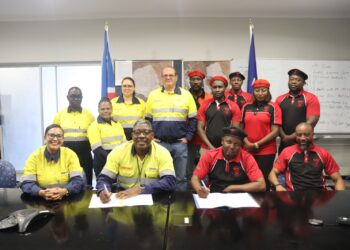
Namibian Marine Phosphate (NMP) says it has completed a final environmental- and social-impact assessment (ESIA), which includes the current and best available scientific data for the area in the ocean where it intends to mine phosphate.
The company has since 2012 struggled to get through the environmental permitting process to get its Sandpiper project developed, owing to resistance from fishing and environmental groups due to the project’s potential impact on the environment.
“As required by Namibian law, under the provisions of the Environmental Management Act, the comprehensive application and Environmental- and Social-Impact Assessment process has been managed by an appointed and independent Environmental Assessment Practitioner (EAP).
“The EAP has now completed the Assessment Phase and the final Marine ESIA Report, which includes the current and best available scientific data for the area and proposed operations, was submitted to the Environmental Commissioner (EC) and other relevant authorities. In accordance with the provisions of Section 35 of EMA 2007, the EC has advised the ESIA has met the prescribed requirements in terms of contents and accordingly the application and ESIA will now be notified in the prescribed manner,†the company said.
NMP said more than 130 interested and affected parties had been formally registered to participate in the application process.
“To address the key issues raised by the public, stakeholders, and registered I&APs, the approach taken throughout the ESIA has been to utilise the best available internationally independent and reputable expertise with specialist knowledge of the BCLME and particularly of the Namibian commercial fisheries. NMP remains fully committed to the responsible commercial, social, and environmental development of the proposed Sandpiper Project for the benefit of all stakeholders, as well as national interests and those of the Namibian public at large,†the company said.
NMP affirms its project’s proposed 20-year mine life comprises an area of 34 square kilometres, less than 2% of the total licence area, and that the average yearly mining area of 1.7 square kilometres is far smaller than the yearly fish trawling area of 18,620 square kilometres.
The earmarked mine area is also located on the continental shelf in water depths of 200m to 220m, and it is therefore within less than the 200m depth protected area for fish trawling and is not considered deep-sea mining – which is generally between 800m and 1,000m.
Based on scale and being situated outside of the 200m depth zone, phosphate mining and fishing can co-exist, NMP argues.
NMP is a joint-venture company between Oman-based Mawarid Mining LLC, and Namibian company Havana Investments.











